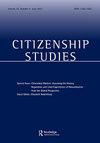Dis/abled decolonial human and citizen futures
IF 1.9
3区 社会学
Q3 POLITICAL SCIENCE
引用次数: 0
Abstract
ABSTRACT This article utilises the dual methodological lens of disability and decolonisation in order to critically examine, in interdisicplinary and global perspective, what it will mean to be both a ‘human’ and a ‘citizen’ in the 21st century. I propose the development of an epistemological framework and methodology of the dis/abling and decolonising of knowledge on humanness and citizenship in order to anticipate demographic, environmental, and technological futures. Firstly, I critically examine how critical disability approaches challenge the able-ist premises of liberal political theory. Secondly, by critically analysing US immigration and US/UK eugenics movements, I illustrate the able-ist, raced, and colonial constructs of human-ness and citizenship using a dual decolonial and disability methodological lens. Finally, I look towards anticipating human and citizen futures through the case of artificial intelligence, where I illustrate both its reification of a raced and able-ist status quo on the one hand, and the potential for changing terrains of the bounds of human-ness and citizenship.失去能力的非殖民化人类和公民的未来
摘要本文利用残疾和非殖民化的双重方法论视角,从跨学科和全球的角度,批判性地审视21世纪的“人”和“公民”意味着什么。我建议开发一个关于人性和公民身份的知识的分解和非殖民化的认识论框架和方法,以预测人口、环境和技术的未来。首先,我批判性地考察了批判性残疾方法是如何挑战自由主义政治理论的干练前提的。其次,通过批判性地分析美国移民和美国/英国优生学运动,我用非殖民化和残疾的双重方法论视角阐释了能干的、种族的和殖民主义的人性和公民身份建构。最后,我期待着通过人工智能的案例来预测人类和公民的未来,在人工智能中,我一方面展示了它对种族和能力现状的具体化,另一方面也展示了改变人类和公民界限的潜力。
本文章由计算机程序翻译,如有差异,请以英文原文为准。
求助全文
约1分钟内获得全文
求助全文
来源期刊

Citizenship Studies
POLITICAL SCIENCE-
CiteScore
3.60
自引率
11.10%
发文量
85
期刊介绍:
Citizenship Studies publishes internationally recognised scholarly work on contemporary issues in citizenship, human rights and democratic processes from an interdisciplinary perspective covering the fields of politics, sociology, history and cultural studies. It seeks to lead an international debate on the academic analysis of citizenship, and also aims to cross the division between internal and academic and external public debate. The journal focuses on debates that move beyond conventional notions of citizenship, and treats citizenship as a strategic concept that is central in the analysis of identity, participation, empowerment, human rights and the public interest.
 求助内容:
求助内容: 应助结果提醒方式:
应助结果提醒方式:


